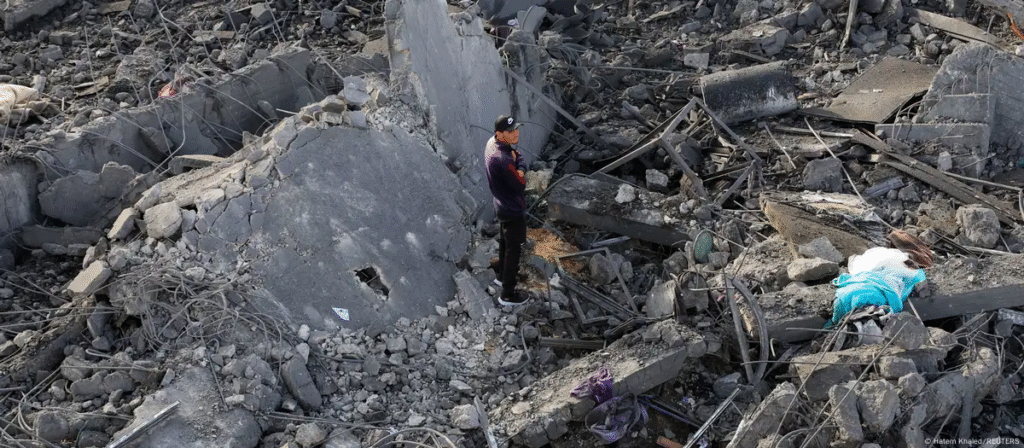Dozens Killed in Overnight Airstrikes on Southern Gaza City
Deadly Strikes Hit Khan Younis
Israeli airstrikes struck Khan Younis in southern Gaza overnight on May 14-15, 2025, killing at least 60 people, according to Palestinian medics. The attacks targeted multiple areas, with 10 airstrikes reported by an Associated Press cameraman.

Nasser Hospital, a major medical facility, received numerous bodies, including women and children. The strikes damaged Gaza’s only remaining cancer-treatment hospital, putting it out of service, Gaza’s Health Ministry said. The bombardment followed another deadly night of attacks on Wednesday, which killed at least 70 people across northern and southern Gaza, including 22 children. The relentless strikes have overwhelmed hospitals, with medics struggling to treat the wounded.
Background of the Conflict
The Israel-Gaza conflict reignited after Hamas’s October 7, 2023, attack on southern Israel, which killed 1,200 people and saw 251 hostages taken. Israel’s response, aimed at destroying Hamas, has killed nearly 53,000 Palestinians, mostly civilians, according to Gaza’s Health Ministry. A ceasefire in January 2025 briefly halted the violence, allowing humanitarian aid to flow. However, the truce collapsed on March 18, 2025, when Israel resumed its offensive, citing Hamas’s failure to release all hostages. Since then, nearly 3,000 more Palestinians have been killed. Hamas still holds 58 hostages, with 23 believed alive. The conflict has displaced over 140,000 people since March, deepening Gaza’s humanitarian crisis.
Who Attacked and What Happened?
Israel’s military carried out the airstrikes, targeting what it called Hamas and Islamic Jihad militants in Khan Younis. The Israeli Defense Forces (IDF) claimed the strikes were precise, aimed at “command-and-control centers” used by Hamas to plan attacks.
However, the strikes hit residential areas and near hospitals, causing significant civilian casualties. Witnesses reported entire families killed in their homes, with rescuers struggling to reach victims trapped under rubble. The attack on the cancer hospital sparked outrage, with Gaza’s Health Ministry accusing Israel of destroying the region’s healthcare system. Posts on X echoed this sentiment, with users calling the strikes deliberate and labeling them a “genocide.” Israel insists it takes steps to avoid civilian harm, but the high death toll has drawn global criticism.
Why Is This Happening After the Ceasefire?
The ceasefire’s collapse stems from unresolved tensions. Israel demands Hamas release all hostages and disarm, while Hamas insists on a full Israeli withdrawal, a lasting ceasefire, and the release of Palestinian prisoners. Talks mediated by Egypt, Qatar, and the United States have stalled, with both sides accusing each other of violating the January agreement. Israel’s intensified offensive aims to pressure Hamas, with Prime Minister Benjamin Netanyahu vowing to “go all the way” to destroy the group. The IDF has expanded operations, seizing parts of Gaza and issuing evacuation orders. Human Rights Watch warned Israel’s plan to displace hundreds of thousands risks “extermination.” The timing of the strikes, during U.S. President Donald Trump’s Middle East visit, dashed hopes of a new truce, as Trump did not visit Israel or push for immediate peace.
Humanitarian Crisis Deepens
The renewed violence has worsened Gaza’s plight. A blockade since March has halted aid, leaving 21 of 36 hospitals partially functional and 13 of 29 Red Crescent clinics closed. Starvation is spreading, with the UN warning of famine. The World Health Organization reported that attacks on medical facilities, like the April strike on Al-Ahli Hospital, have crippled healthcare.
Palestinians fear a “second Nakba,” with Israel planning to hold parts of Gaza indefinitely and resettle its population, a proposal rejected globally. Hamas’s release of an Israeli-American hostage on May 12 raised faint hopes for talks, but Netanyahu’s pledge to escalate suggests more bloodshed ahead. International calls for a ceasefire grow louder, but prospects remain dim.


1 Comment